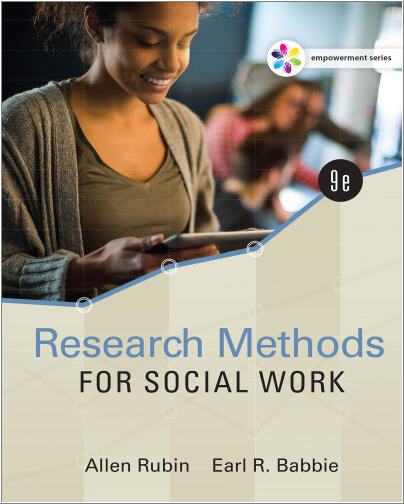Description
Empowerment Series: Research Methods for Social Work 9th Edition by Allen Rubin, ISBN-13: 978-1305633827
[PDF eBook eTextbook]
- Publisher: Cengage Learning; 9th edition (January 1, 2016)
- Language: English
- 720 pages
- ISBN-10: 1305633822
- ISBN-13: 978-1305633827
If you’re intimidated by the thought of taking research methods, Rubin and Babbie’s classic bestseller can help you overcome the fear factor often associated with this course with its reader-friendly presentation of all aspects of the research endeavor. If you’re not intimidated, you’ll still appreciate the authors’ clear and often humorous writing style as well as the book’s depth and breadth of coverage.
RESEARCH METHODS FOR SOCIAL WORK, Ninth Edition, strikes an optimal balance of quantitative and qualitative research techniques — illustrating how the two methods complement one another and can be integrated in the same study. Relevant examples from real-world settings highlight the connections between research and social work practice. Comprehensive, friendly, accurate, and integrating the best of technology, this text is widely considered the best text for the research methods course — and when you read it, you’ll see why.
Table of Contents:
Contents in Brief
Contents in Detail
Preface
Part 1: An Introduction to Scientific Inquiry in Social Work
Ch 1: Why Study Research?
Introduction
The Scientific Method
Other Ways of Knowing
Recognizing Flaws in Unscientific Sources of Social Work Practice Knowledge
The Utility of Scientific Inquiry in Social Work
Reviews of Social Work Effectiveness
The Need to Critique Research Quality
Compassion and Professional Ethics
Utility of Research in Applied Social Work Settings
Main Points
Review Questions and Exercises
Internet Exercises
Ch 2: Evidence-Based Practice
Introduction
Critical Thinking in EBP
EBP Implies Career-Long Learning
Steps in the EBP Process
Distinguishing the Evidence-Based Process from Evidence-Based Practices
Controversies and Misconceptions about EBP
Common Factors and the Dodo Bird
Real-World Obstacles to Implementing EBP in Everyday Practice
Main Points
Review Questions and Exercises
Internet Exercises
Ch 3: Factors Influencing the Research Process
Introduction
The Phases of the Research Process
Theory and Values
Two Logical Systems: Comparing Deduction and Induction
Probabilistic Knowledge
Two Causal Models of Explanation
Ideologies and Paradigms
Main Points
Review Questions and Exercises
Internet Exercises
Ch 4: Quantitative, Qualitative, and Mixed Methods of Inquiry
Introduction
Objectivity and Subjectivity in Scientific Inquiry
A Comparison of Qualitative and Quantitative Methods of Inquiry
Mixed Methods of Inquiry
Main Points
Practice-Related Exercises
Internet Exercises
Part 2: The Ethical, Political, and Cultural Context of Social Work Research
Ch 5: The Ethics and Politics of Social Work Research
Introduction
Institutional Review Boards
Four Ethical Controversies
Bias and Insensitivity Regarding Sex, Gender Identity, and Culture
The Politics of Social Work Research
Main Points
Review Questions and Exercises
Internet Exercises
Ch 6: Culturally Competent Research
Introduction
Developing Cultural Competence
Culturally Competent Measurement
Measurement Equivalence
Problematic Issues in Making Research More Culturally Competent
Main Points
Review Questions and Exercises
Internet Exercises
Part 3: Problem Formulation and Measurement
Ch 7: Problem Formulation
Introduction
Purposes of Social Work Research
Multiple Purposes
Selecting Topics and Research Questions
Narrowing Research Topics into Research Questions
Attributes of Good Research Questions
Involving Others in Problem Formulation
Literature Review
The Time Dimension
Units of Analysis
Main Points
Review Questions and Exercises
Internet Exercises
Ch 8: Conceptualization in Quantitative and Qualitative Inquiry
Introduction
Contrasting Quantitative and Qualitative Conceptualization
Conceptual Explication in Quantitative Inquiry
Operational Definitions
Operationalization Choices
Examples of Operationalization in Social Work
Existing Scales
Operationalization Goes On and On
Levels of Measurement
Conceptualization in Qualitative Inquiry
Main Points
Review Questions and Exercises
Internet Exercises
Ch 9: Measurement
Introduction
Common Sources of Measurement Error
Avoiding Measurement Error
Reliability
Validity
An Illustration of Reliable and Valid Measurement in Social Work: The Clinical Measurement Package
Relationship between Reliability and Validity
Reliability and Validity in Qualitative Research
Main Points
Review Questions and Exercises
Internet Exercises
Ch 10: Constructing Measurement Instruments
Introduction
Guidelines for Asking Questions
Questionnaire Construction
Constructing Scales
Constructing Qualitative Measures
Main Points
Review Questions and Exercises
Internet Exercises
Part 4: Designs for Evaluating Programs and Practice
Ch 11: Causal Inference and Experimental Designs
Introduction
Criteria for Inferring Causality
Internal Validity
Preexperimental Pilot Studies
Experimental Designs
Additional Threats to the Validity of Experimental Findings
Attrition (Experimental Mortality)
External Validity
Main Points
Review Questions and Exercises
Internet Exercises
Ch 12: Quasi-Experimental Designs
Introduction
Nonequivalent Comparison Groups Design
Ways to Strengthen the Internal Validity of the Nonequivalent Comparison Groups Design
Simple Time-Series Designs
Multiple Time-Series Designs
Cross-Sectional Studies
Case Control Studies
Practical Pitfalls in Carrying Out Experiments and Quasi Experiments in Social Work Agencies
Qualitative Techniques for Avoiding or Alleviating Practical Pitfalls
Main Points
Review Questions and Exercises
Internet Exercises
Ch 13: Single-Case Evaluation Designs
Introduction
Overview of the Logic of Single-Case Designs
Single-Case Designs in Social Work
Use of Single-Case Designs as Part of Evidence-Based Practice
Measurement Issues
Data Gathering
Alternative Single-Case Designs
Data Analysis
B and B+ Designs
The Role of Qualitative Research Methods in Single-Case Evaluation
Main Points
Review Questions and Exercises
Internet Exercises
Ch 14: Program Evaluation
Introduction
Historical Overview
Planning an Evaluation and Fostering Its Utilization
Purposes and Types of Program Evaluation
An Illustration of a Qualitative Approach to Evaluation Research
The Politics of Program Evaluation
Main Points
Review Questions and Exercises
Internet Exercises
Part 5: Data Collection Methods with Large Sources of Data
Ch 15: Sampling
Introduction
Nonprobability Sampling
Selecting Informants in Qualitative Research
The Logic of Probability Sampling
Can Some Randomly Selected Samples Be Biased?
Sample Size and Sampling Error
Types of Probability Sampling Designs
Multistage Cluster Sampling
Illustration: Sampling Social Work Students
Probability Sampling in Review
Avoiding Sex Bias in Sampling
Main Points
Review Questions and Exercises
Internet Exercises
Ch 16: Survey Research
Introduction
Self-Administered Questionnaires
Interview Surveys
Telephone Surveys
Online Surveys
Mixed-Mode Surveys
Comparison of Different Survey Methods
Strengths and Weaknesses of Survey Research
Main Points
Review Questions and Exercises
Internet Exercises
Ch 17: Analyzing Existing Data: Quantitative and Qualitative Methods
Introduction
A Comment on Unobtrusive Measures
Secondary Analysis
Content Analysis
Historical and Comparative Analysis
Unobtrusive Online Research
Main Points
Review Questions and Exercises
Internet Exercises
Part 6: Qualitative Research Methods
Ch 18: Qualitative Research: General Principles
Introduction
Topics Appropriate for Qualitative Research
Prominent Qualitative Research Paradigms
Qualitative Sampling Methods
Strengths and Weaknesses of Qualitative Research
Standards for Evaluating Qualitative Studies
Research Ethics in Qualitative Research
Main Points
Review Questions and Exercises
Internet Exercises
Ch 19: Qualitative Research: Specific Methods
Introduction
Preparing for the Field
The Various Roles of the Observer
Relations to Participants: Etic and Emic Perspectives
Reflexivity
Qualitative Interviewing
Life History
Feminist Methods
Focus Groups
Recording Observations
Main Points
Review Questions and Exercises
Internet Exercises
Ch 20: Qualitative Data Analysis
Introduction
Linking Theory and Analysis
Qualitative Data Processing
Computer Programs for Qualitative Data
Main Points
Review Questions and Exercises
Internet Exercises
Part 7: Analysis of Quantitative Data
Ch 21: Descriptive Data Analysis
Introduction
Coding
Data Entry
Data Cleaning
Univariate Analysis
Bivariate Analysis
Interpreting Multivariate Tables
Constructing Tables
Measuring the Strength of Relationships
Descriptive Statistics and Qualitative Research
Main Points
Review Questions and Exercises
Internet Exercises
Ch 22: Inferential Data Analysis
Introduction
Chance as a Rival Hypothesis
Statistical Significance
Interpreting Relationship Strength
Substantive Significance
Statistical Power Analysis
Selecting and Calculating Tests of Statistical Significance
Meta-Analysis
Main Points
Review Questions and Exercises
Internet Exercises
Part 8: Writing Research Proposals and Reports
Ch 23: Writing Research Proposals and Reports
Introduction
Writing Research Proposals
Finding a Funding Source and RFPs
Writing Social Work Research Reports
Organization of the Report
Additional Considerations When Writing Qualitative Reports
Main Points
Review Questions and Exercises
Internet Exercises
Appendix A: Using the Library
Appendix B: Statistics for Estimating Sampling Error
Appendix C: Critically Appraising Meta-Analyses
Glossary
Bibliography
Index
Allen Rubin has been doing and teaching research since 1976, when he received his Ph.D. from the University of Pittsburgh. Renowned in social work, Dr. Rubin has written several research texts, published numerous research studies on social work practice, and is a past president of the Society for Social Work and Research.
Dr. Earl Babbie is the Campbell Professor Emeritus in Behavioral Sciences at Chapman University in Southern California. He taught sociology at the University of Hawaii from 1968 through 1979, took time off from teaching and research to write full time for eight years. He then joined the Chapman University faculty in 1987. Credited with defining research methods for the social sciences, Dr. Babbie has written several texts, including THE PRACTICE OF SOCIAL RESEARCH, as well as numerous research articles and monographs. For 25 years he has been active in the American Sociological Association, where he served on the executive committee. He also is a past president of the Pacific Sociological Association and the California Sociological Association. Dr. Babbie received his A.B. from Harvard and his doctorate from the University of California, Berkeley.
What makes us different?
• Instant Download
• Always Competitive Pricing
• 100% Privacy
• FREE Sample Available
• 24-7 LIVE Customer Support




